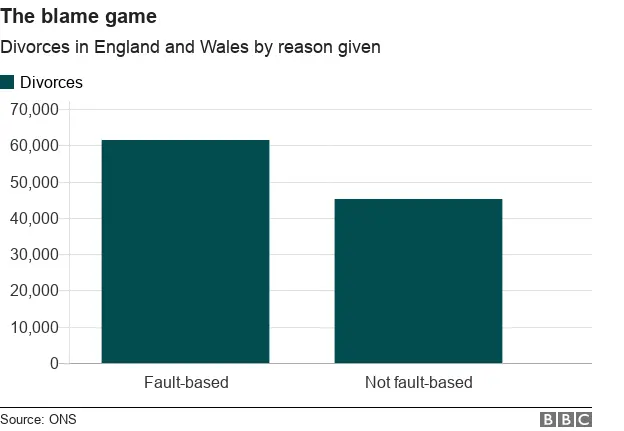No-fault divorce: Could it increase rates?
 PA
PACouples in England and Wales will be able to end their marriages more quickly without blaming each other. But could speeding up the process mean more divorces?
At the moment, there are five official grounds for divorce which apply in England, Wales and Northern Ireland.
Three involve attributing blame, and mean that divorce proceedings can start straight away - the whole process can then be completed within three to six months:
- Unreasonable behaviour
- Adultery
- Desertion
The other two, which do not involve blame, take longer: separation for two years with consent and separation for five years if one of the parties does not agree to the divorce.
The government says that a law ensuring divorcing couples no longer have to blame each other for the breakdown of their marriage will "help reduce family conflict".
To try to assess whether reducing the waiting time leads to more divorces, we can look to Scotland where no-fault divorce after one year of living apart was introduced in 2006.
Up to that point, Scottish divorce law was mostly the same as in England and Wales, according to law professor Liz Trinder.
When the new law was introduced, there was a spike in the number of divorces - from 10,875 in 2005 to 13,012 in 2006, but this quickly fell back down again.
Since then there has been a downward trend in the number of divorces - although this comes at the same time as a longer-term downward trend in the number of marriages.
In 2017 there were 6,766 divorces - half as many as 10 years earlier, just after the law changed.
The new rules for England and Wales could reduce the waiting time for no-fault divorce to below Scottish levels.
The government is proposing changes to the law which will make no-fault divorce as quick as fault-based divorce, but will also introduce a new minimum time-frame of six months to finalise divorce in England and Wales.
If the long-term divorce rate in Scotland was unaffected by reforms to the law, the reasons people were giving for divorce did change.
The proportion of divorces where unreasonable behaviour or adultery was given as a reason fell considerably.
The Office of National Statistics found that in 2015 in Scotland, just 6% of divorcing couples relied on the fault-based grounds of adultery or unreasonable behaviour. In England and Wales, it was 60%.

But in Scotland there was already less reliance on fault-based grounds before the law changed - used for 20% of divorces, compared with three times as many in the rest of Britain.
A cheaper "simplified procedure" was introduced in Scotland in 1982, only available to people using grounds of separation. This made separation the easiest grounds for getting a divorce.
In England and Wales, the fastest route at the moment is by alleging unreasonable behaviour or adultery. Unreasonable behaviour is consistently the most common grounds for divorce, although adultery comes in behind separation as a reason given.
A team of researchers - including Prof Trinder - in a report for the Nuffield Foundation found that in England and Wales, rather than deterring divorce, the element of fault "simply enables a quick exit from a marriage".
That is, the data available suggests those wishing to divorce will use whichever grounds are available to do so as quickly and as easily as possible.
Looking further afield than the UK, many recent studies have also found no effect or just a temporary effect of no-fault divorce on divorce rates.



